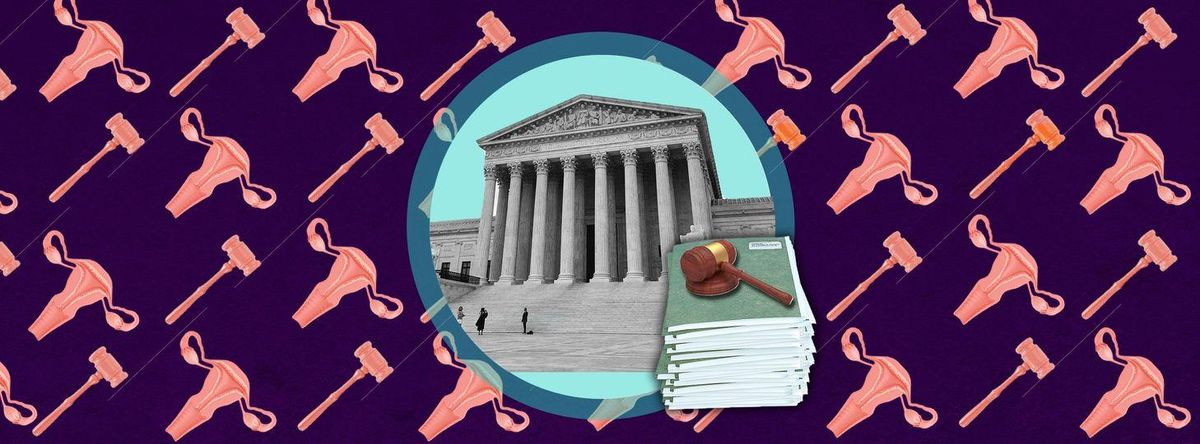The Supreme Court’s conservative majority ruled on Friday to overturn Roe v. Wade, the landmark 1973 decision that enshrined abortion as a federal constitutional right.
“Roe was egregiously wrong from the start,” the decision penned by Justice Samuel Alito in Dobbs v. Jackson Women’s Health Organization to overrule precedent and uphold Mississippi’s 15-week abortion ban reads. “It is time to heed the Constitution and return the issue of abortion to the people’s elected representatives.”
Four other conservative justices—Amy Coney Barrett, Brett Kavanaugh, Neil Gorsuch, and Clarence Thomas—voted with Alito to overturn Roe, while all Democratic-appointed justices—Elena Kagan, Sonia Sotomayor, and Stephen Breyer—plus Chief Justice John Roberts dissented.
Want to understand the world a little better? Subscribe to GZERO Daily by Ian Bremmer for free and get new posts delivered to your inbox every week.
The ruling in Dobbs shouldn’t come as a surprise to anyone who’s been paying attention. Abortion up until fetal viability (now around 23 weeks of pregnancy) has been legal in the entire United States for nearly 50 years, first established in Roe and reaffirmed in 1992 by Planned Parenthood v. Casey. Since then, however, opponents of legal abortion have been diligently working to reverse these decisions, spending billions to lobby for anti-abortion policies, elect anti-abortion candidates, and appoint anti-abortion judges.
Their efforts paid off: the Supreme Court has a 6-3 conservative majority, federal courts are packed with conservative judges, and Republican states have passed a slew of laws curtailing abortion rights. While for years SCOTUS had sidestepped the issue of Roe’s constitutionality despite numerous challenges, abortion opponents got a major win in December 2021 when Texas’s so-called “heartbeat” act outlawing abortion after 6 weeks of pregnancy (enforced by private individuals through civil lawsuits rather than by state officials) was allowed to stand by the highest court. At the time, many legal analysts warned this decision signaled that the end of Roe was near. They were right.
Where Americans stand on abortion
It depends on the question you ask. Polls show the vast majority of Americans (90%) believe abortion should be legal in some circumstances and illegal in others. That includes majorities of both Democrats (65%) and Republicans (79%). Six-in-ten Americans say abortion should be legal in all or most cases, while 37% believe it should be illegal in all or most cases. Fewer than one-in-ten Americans think abortion should always be illegal, while 19% say it should be legal in every case without exception.
In Republican-leaning states, especially in the South and Midwest, support for abortion is low. Women and younger Americans are more likely to support legal abortion. Notably, nearly half (47%) of Republicans under 30 say that abortion should be legal in all or most cases.
Most Americans believe abortion should be legal in the first trimester of pregnancy—which in 2019 comprised 93% of all abortions—after which opposition to abortion rises significantly among even supporters of legal abortion. (Roe legalized abortion up until fetal viability, which is currently around 23 weeks, or well into the second trimester.) And most Americans, including majorities of Democrats and Republicans, say abortion should be legal if the pregnancy threatens the mother’s life or if it’s a result of rape.
Many Americans hold seemingly contradictory views about the issue. For instance, about one-third say that “the decision about whether to have an abortion should belong solely to the pregnant woman” at the same time as they believe that “human life begins at conception, so a fetus is a person with rights.” Among supporters of abortion rights, one-third believe life begins at conception (33%), while a majority believe the timing of abortion should matter in determining its legality (56%). Meanwhile, 41% of those who oppose abortion rights say pregnant women should have some or all the power to decide whether to have an abortion.
The consequences of reversing Roe
For starters, abortion access will be drastically curtailed across large swaths of the nation, especially in the South and Midwest. Because individual states will be allowed to decide whether to protect, restrict, or ban abortion, the implications will be radically different in red and blue parts of the country.
In anticipation of the ruling, many Republican states have spent the last few months passing anti-abortion laws due to come into force as soon as Roe is overturned. For their part, Democratic states have been preemptively enshrining abortion protections in state law. According to the Guttmacher Institute, 13 states already have “trigger laws” on the books that would automatically and immediately outlaw abortion, while another 13 states are likely to heavily restrict or ban the procedure in short order. These 26 states are home to more than half of all women of reproductive age in the United States, nearly all of whom came of age while abortion was legal nationwide.
Studies show that abortion bans don’t reduce the incidence of abortion. Instead, abortions simply become more dangerous for women. According to the World Health Organization, 23,000 women die globally each year from unsafe abortions and tens of thousands more suffer significant health complications. Banning abortion will also lead to an increase in the number of pregnancy-related deaths, as carrying a fetus to term is often lethal for women. The maternal mortality rate in America is two times higher than in any other industrialized country.
Abortion restrictions disproportionately affect poor women and women of color, who account for nearly half of all abortions and experience much higher rates of maternal mortality and morbidity.
Abortion a tailwind for Dems, but GOP still likely to take Congress
Politically, the Dobbs decision could work to the Democrats’ advantage, even if only marginally.
The fact is that most Americans (66%) don’t want to see Roe overturned and are out of step with the policies being enacted by many Republican states. Facing an unpopular incumbent who is seen as weak on the economy, immigration, crime, and cultural issues, Republicans would much prefer to run in opposition to Biden’s policies without having to offer any of their own. That’s why the Republican Party has thus far downplayed the issue, instead choosing to focus on the leak. But Dobbs will inevitably put abortion, one of the least popular issues for them, directly in the electoral spotlight.
No longer shielded by Roe from having to legislate on the issue, Republicans in swing states will be pressured by the far-right to enact abortions policies that are too extreme for much of the GOP base and independents, risking a backlash that potentially depresses turnout and pushes moderates to vote for Democrats. It’s equivalent to what Democrats did when they let their party get captured by the loud few on wokeism, transgender policies, and critical race theory: they overreached and got punished for it. Republicans could well suffer the same fate.
For the midterms, the key variable is turnout. Surveys show that voters overwhelmingly care about the economy, an area where Republicans are strongly favored. Presumably, most people who are animated by abortion were already likely to vote in November. However, polling data released after the leak suggests abortion could energize Democrats more than Republicans, especially young progressives and women who had soured on President Biden and weren’t motivated to vote.
🔔 And if you haven't already, don't forget to subscribe to my free newsletter, GZERO Daily by Ian Bremmer, to get new posts delivered to your inbox.


















